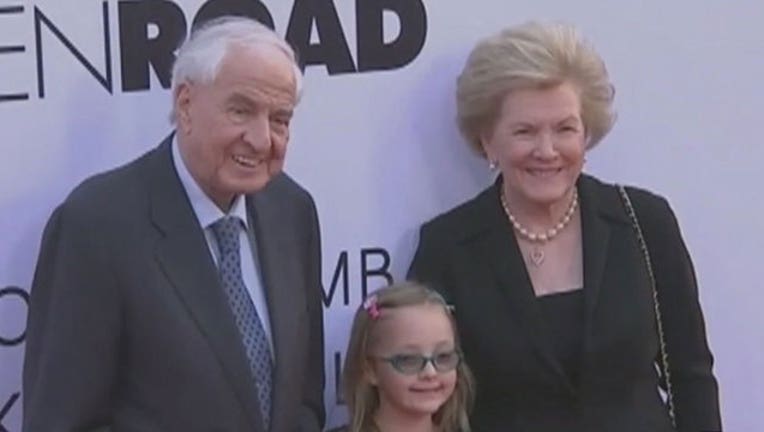'Pretty Woman' filmmaker Garry Marshall dead at 81

Garry Marshall knew how to tug at moviegoers' heartstrings, whether with unlikely love in "Pretty Woman" or sentimental loss in "Beaches."
LOS ANGELES (AP) — Garry Marshall knew how to tug at moviegoers' heartstrings, whether with unlikely love in "Pretty Woman" or sentimental loss in "Beaches."
But it was goofy, crowd-pleasing comedy that endeared the writer and director to generations of TV viewers in hit sitcoms including "Happy Days, "Laverne & Shirley" and "Mork & Mindy." Marshall, who died Tuesday at 81, said in a 1980s interview that humor was his necessary path in life.
"In the neighborhood where we grew up in, the Bronx, you only had a few choices. You were either an athlete or a gangster, or you were funny," the New York native said.
Marshall also had a memorable on-screen presence, using his hometown accent and gruff delivery in colorful supporting roles that included a practical-minded casino boss untouched by Albert Brooks' disastrous luck in "Lost in America" and a crass network executive in "Soapdish."
He died at a hospital in Burbank, California, of complications from pneumonia following a stroke, his publicist Michelle Bega said in a statement. An outpouring of respect and affection quickly followed.
"A great, great guy and the best casino boss in the history of film," actor-filmmaker Brooks posted on Twitter.
Richard Gere, who starred opposite Julia Roberts in "Pretty Woman," said in a statement that "everyone loved Garry. He was a mentor and a cheerleader and one of the funniest men who ever lived. He had a heart of the purest gold and a soul full of mischief. He was Garry."
Henry Winkler, who starred as Fonzie on "Happy Days," saluted Marshall in a tweet as "larger than life, funnier than most, wise and the definition of friend."
He rejected retirement, serving as a consultant on CBS' 2015 reboot of "The Odd Couple," starring Matthew Perry and Thomas Lennon, and appearing in an episode this year as Oscar's father, Walter. Among his final credits was "Mother's Day," a film released last April starring Jennifer Aniston, Kate Hudson and Roberts.
Marshall, the brother of actress-director Penny Marshall, earned a degree in journalism from Northwestern University and worked at the New York Daily News. But he found he was better at writing punchlines.
He began his entertainment career in the 1960s selling jokes to comedians, then moved to writing sketches for "The Tonight Show" with Jack Paar in New York. He caught the eye of comic Joey Bishop, who brought him to Los Angeles to write for "The Joey Bishop Show."
Sitcoms quickly proved to be Marshall's forte. He and then-writing partner Jerry Belson turned out scripts for the most popular comedies of the '60s, including "The Lucy Show," ''The Danny Thomas Show" and "The Dick Van Dyke Show."
Marshall and Belson detoured into screenwriting in 1967 with "How Sweet It Is," starring Debbie Reynolds, and followed it up with "The Grasshopper" (1970) with Jacqueline Bisset. But the two men kept their hand in TV.
In 1970, they turned Neil Simon's Broadway hit, "The Odd Couple," into a sitcom starring Jack Klugman and Tony Randall and produced by Marshall. It ran for five seasons and proved the beginning of a TV sitcom empire that lives on in unending 21st-century reruns.
In January 1979, Marshall had three of the top five comedies on the air with "Happy Days," which ran from 1974-84; "Laverne & Shirley" (1976-83), which starred Penny Marshall and Cindy Williams, and "Mork & Mindy" (1978-82) with newcomer Robin Williams.
"The New Odd Couple," a reboot with African-American actors Ron Glass and Demond Wilson in the lead roles, aired from 1982-83 but was less successful.
Marshall defended his body of TV work, which won more viewers than honors, in his 1995 autobiography, "Wake Me When It's Funny," written with his daughter, Lori Marshall.
"Critics have knocked me for targeting society's lowest common denominator," he wrote. "I believe that television was, and still is, the only medium that can truly reach society's lowest common denominator and entertain those people who maybe can't afford a movie or a play. So why not reach them and do it well?" he said.
Penny Marshall told The New York Times in 2001 that her brother "has a life. He's not into the show business glitterati. If he has a hot movie, that's great. But if he has something that doesn't do great, he's not around those people who won't speak to you or will make you feel terrible."
After cranking out what Marshall once estimated to be 1,000 sitcom episodes, he switched his focus to the big screen with 1984's "The Flamingo Kid," a coming-of-age story starring Matt Dillon, which Marshall wrote and directed.
He concentrated on directing with his later films, including 1986's "Nothing in Common," with Tom Hanks and Jackie Gleason; "Overboard" (1987) starring Goldie Hawn and Kurt Russell; "Beaches" (1988) with Bette Midler and Barbara Hershey; "Pretty Woman" (1990) and "Dear God" (1996) with Greg Kinnear and Laurie Metcalf.
The Gere-Roberts pairing that helped make "Pretty Woman" a smash hit did the same for "Runaway Bride," which reunited them in 1999. "The Princess Diaries" in 2001 was another winner, although Marshall suffered a flop with "Georgia Rule" (2007), starring Jane Fonda and Lindsay Lohan.
Marshall is survived by his wife, Barbara, and the couple's three children, Lori, Kathleen and Scott.
Funeral services will be private but a memorial is being planned for his birthday on Nov. 13, his publicist's statement said.
___
Associated Press Writer Andrew Dalton and AP Entertainment Writer Sandy Cohen contributed to this story.

